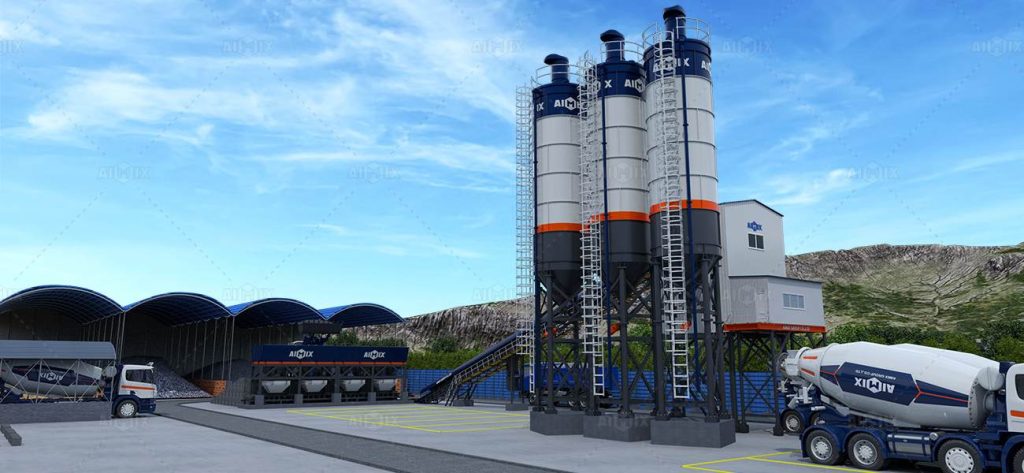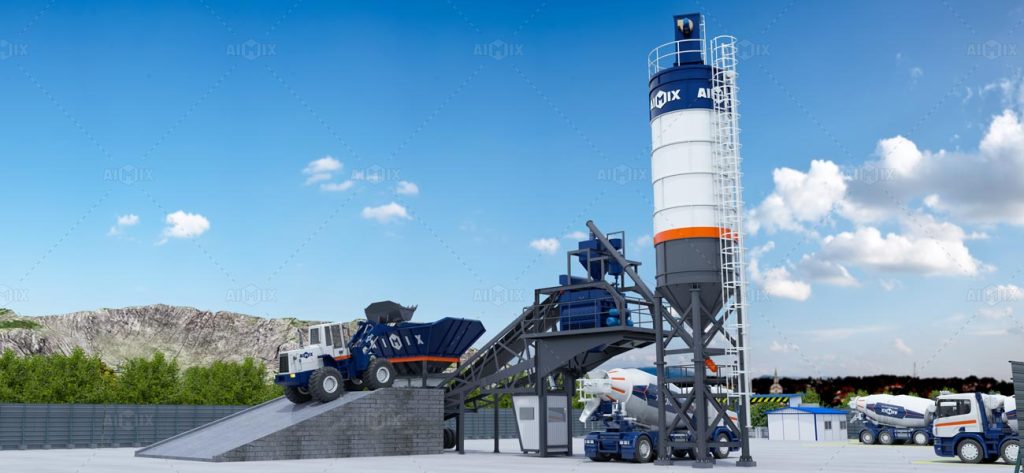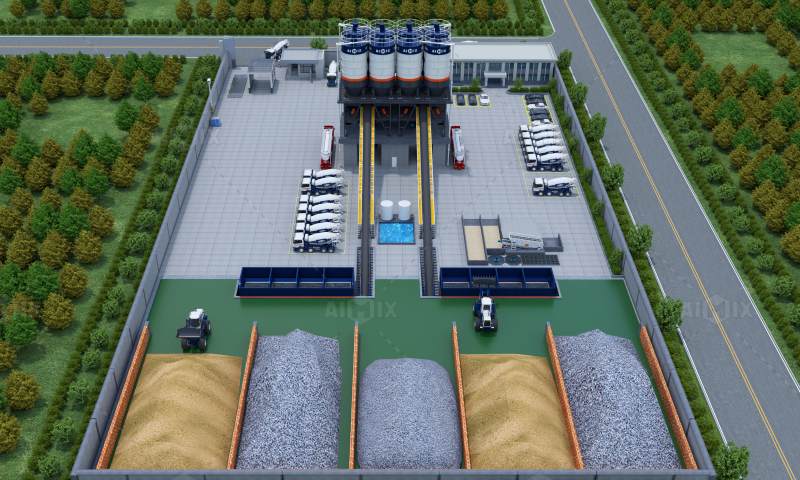In today’s construction industry, environmental sustainability is a key concern. Concrete batching plant manufacturers are increasingly focused on developing solutions that minimize environmental impact while maintaining efficiency and performance. This article explores how concrete batching plant manufacturers address environmental concerns through innovative technologies, sustainable practices, and regulatory compliance.

Energy Efficiency and Resource Management
Energy-Efficient Designs: Manufacturers are integrating energy-efficient technologies into their concrete batching plants. This includes the use of advanced control systems that optimize the plant’s energy consumption by adjusting operations based on real-time needs. Energy-efficient motors, variable frequency drives, and LED lighting are examples of technologies that reduce energy usage.
Resource Optimization: Concrete batching plants are designed to maximize the use of available resources. For instance, manufacturers are incorporating systems that recycle and reuse water from the batching process. This reduces the demand for fresh water and minimizes wastewater discharge. Efficient aggregate handling systems also reduce waste by ensuring precise measurement and minimal spillage.
Emission Reduction
Dust Control: Dust emissions from concrete batching plants can be significant, especially during aggregate handling and mixing. To address this, manufacturers implement advanced dust suppression systems, including dust collectors, baghouses, and wet scrubbers. These systems capture and filter dust particles, reducing airborne emissions and improving air quality.
Low-Emission Equipment: Manufacturers are developing low-emission equipment to minimize the environmental impact of concrete production. This includes the use of low-emission engines and fuel-efficient technologies that reduce exhaust emissions. Additionally, some batch mixing plants are designed to operate with alternative fuels or electric power, further lowering emissions.

Sustainable Materials and Practices
Use of Recycled Materials: Concrete batching plant manufacturers are promoting the use of recycled materials in concrete production. This includes incorporating recycled aggregates and supplementary cementitious materials (SCMs) such as fly ash, slag, and silica fume. Using recycled materials reduces the demand for virgin resources and lowers the environmental footprint of concrete production.
Eco-Friendly Additives: Manufacturers are also focusing on eco-friendly additives that enhance the performance of concrete while minimizing environmental impact. These additives can improve the durability and longevity of concrete, reducing the need for repairs and replacements over time.
Water Management
Closed-Loop Water Systems: To address water usage concerns, manufacturers are implementing closed-loop water systems that recycle water used in the batching process. These systems capture wastewater, treat it, and reuse it in subsequent batches. This approach significantly reduces water consumption and minimizes environmental impact.
Rainwater Harvesting: Some concrete batching plants are incorporating rainwater harvesting systems to collect and use rainwater for batching purposes. This reduces reliance on potable water sources and lowers overall water consumption.

Compliance with Environmental Regulations
Regulatory Adherence: Concrete batching plant manufacturers ensure that their products comply with local, national, and international environmental regulations. This includes adhering to standards for emissions, noise levels, and waste management. Compliance ensures that plants operate within legal limits and contribute to overall environmental protection.
Certification and Standards: Many manufacturers seek certification from environmental standards organizations, such as ISO 14001, which focuses on effective environmental management systems. Certification demonstrates a commitment to environmental sustainability and helps manufacturers continuously improve their environmental performance. As a reliable manufacturer, Aimix offers different types of concrete plants to match different project needs.
Innovation and Research
Ongoing Research: Manufacturers invest in research and development to explore new technologies and practices that enhance environmental sustainability. This includes developing innovative concrete formulations that require less energy to produce and exploring new ways to reduce the environmental impact of the entire concrete production process.
Collaborations: Collaboration with environmental organizations, research institutions, and industry experts helps manufacturers stay informed about the latest advancements in sustainable practices. These partnerships drive innovation and contribute to the development of more eco-friendly concrete batching solutions. Reliable batching plant manufacturers design and produce both common and new type concrete plant machine to suit different requirements.
Education and Training
Operator Training: Manufacturers provide training for plant operators to ensure they understand and implement best practices for minimizing environmental impact. Training covers areas such as efficient resource use, waste management, and the proper operation of environmental control systems.
Awareness Programs: Manufacturers also engage in awareness programs to educate stakeholders about the importance of environmental sustainability. This includes providing information on the environmental benefits of modern batching plants and encouraging the adoption of sustainable practices in the construction industry.
Concrete batching plant manufacturers are increasingly addressing environmental concerns through a range of innovative technologies and sustainable practices. By focusing on energy efficiency, emission reduction, resource management, and compliance with environmental regulations, manufacturers contribute to a more sustainable construction industry. Ongoing research, collaboration, and education further support the development of eco-friendly solutions, ensuring that concrete batching plants not only meet performance standards but also align with environmental goals. As the construction industry continues to prioritize sustainability, the efforts of concrete batching plant manufacturers play a crucial role in shaping a greener future.